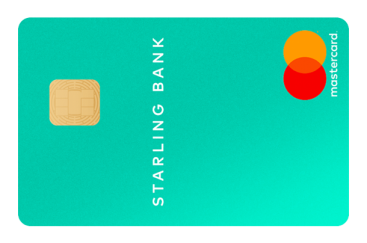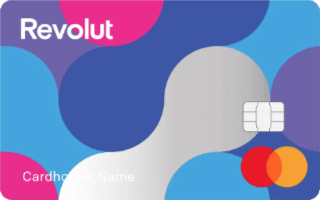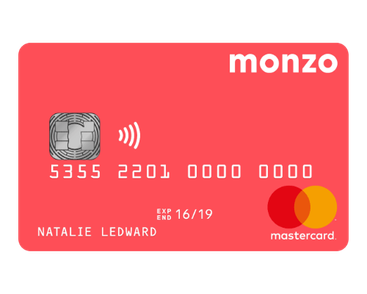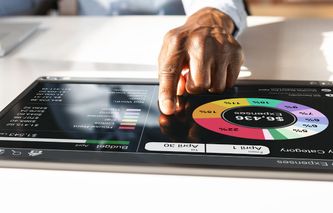Are you tired of juggling various tasks like taxes, invoicing, admin duties, and trying to keep your clients happy, both in the UK and overseas? Being self-employed can be stressful, but it doesn't have to be. One way to reduce the hassle is to have a reliable business account that fits your needs.
So, we've put together a list of the best bank accounts for self-employed individuals in the UK. In this article, we list the best bank accounts for self-employed people in the UK so you can find the right one for you.
Bank Accounts For The Self-Employed - Our Top Picks
| Name | Score | Visit | Disclaimer | |
|---|---|---|---|---|
 | 8.5 | Visitstarlingbank.com | ||
 | 9.2 | Visitwise.com | ||
 | 8.5 | Visitrevolut.com | ||
 | 8.0 | Visitwww.chase.co.uk/ | ||
 | 7.4 | Visitmonese.com |
Top Sole Trader Bank Accounts Reviewed
We understand that time is valuable, especially when you're self-employed. Therefore, we have researched and reviewed the best business bank accounts for you, each offering different benefits.
Best bank accounts for self-employed individuals at a glance
Best Overall Bank Account for the Self-Employed in the UK: Starling
Best for multi-currency accounts: Revolut
Best budgeting tools: Monzo Business
The best business account to reduce admin: ANNA Money
Best for sole traders with international clients: Wise
Best for in-app, all-around business support: Virgin Money
Best for EEA residents with a UK Company: Monese

With no fees for management or transactions within the UK, Starling is the best sole trader account on this list. What truly sets it apart from the competition is its versatile app, which offers most of its features for free.
Besides robust budgeting tools, Starling’s Business Toolkit can help you manage your accounting, budgeting, and bookkeeping, and help you create reports that will help you with your tax self-assessment. It also offers a 1-Year Business Fixed Saver with 2.50% AER.
While Starling is a great choice for self-employed individuals working exclusively within the UK, it’s not the best for those who do business internationally. There are additional fees for opening a euro or US dollar account – alternatively, you can get a free multi-currency account with Revolut.
Pros
- Funds are protected by FSCS
- No charges for UK payments, ATM withdrawals, and purchases
- Wide range of business integrations
- Optional business overdrafts, loans, and fixed savings accounts
Cons
- 0.7% depositing fee
- Overdrafts and loans aren’t available to sole traders
- It has no physical presence
- Euro and dollar accounts come as paid add-ons

Revolut offers the best account for sole traders who do business internationally. It allows you to spend money in 150 currencies abroad without any fees and offers useful features like expense and spending control, invoicing, bookkeeping, budgeting tools, and a multi-currency account.
It‘s worth mentioning that Revolut is not a bank, but rather a digital money institution. As a result, it doesn’t offer business loans, overdrafts, or a fixed-interest rate savings account, and your funds aren't covered by FSCS protection.
Nonetheless, the company is required to keep client funds separate from business assets, so your funds won’t be seized if the company goes under. However, if Revolut doesn’t meet your needs or you require more banking features, you can explore Starling or Monzo, which are fully licensed banks.
Pros
- Ability to hold and use 30 currencies via the multi-currency account
- Integrations with essential business apps and budgeting tools.
- Uses interbank exchange rate, no hidden fees in currency conversion
- You can spend money in over 150 currencies
Cons
- You can’t earn interest on savings
- Funds are not protected by FSCS
- Business borrowing and overdrafts are not available
- There are no cash or cheque services

Monzo Business account is simple, free, and feature-rich – an excellent tool for those who are just starting out. Its Pro account sets you back £5 a month, but offers the accounting software Xero for free for six months, tax pots to set aside the money you owe to HMRC, and spending insights.
Its fee-free Lite version doesn’t come with tax pots or accounting software integration, but you can still make use of its budgeting tools and spending categorisations. The budgeting tools allow you to track, set aside, and even lock funds.
You can deposit funds via cash, and it's cheaper to do so when compared to Monzo’s closest competitor, Starling. However, Monzo Business deposits are limited between £5 to £300 at one time, and £1,000 maximum every six months.
Pros
- Categorised payments
- Free UK bank transfers
- Zero fees on international spending and no additional exchange fees
- Xero and QuickBooks integrations, free for 6 months
Cons
- No overdraft available
- No physical branches
- Deposit limits are low
ANNA is designed to reduce the admin work for small businesses, freelancers, and sole traders alike. While provides the fundamental features of a bank account, ANNA is more of an assistant to business owners, providing them with features like invoicing, tax calculation, VAT returns services, and expense tracking.
While its chat-focused app isn’t to everyone’s liking, ANNA’s customer support is one of the best in business. You should note that as it’s not a bank per se, ANNA doesn’t have features such as savings, overdrafts, cheque deposits, or FSCS protection.
Pros
- The support team is excellent, available 24/7 with 10 minutes response time on average
- In-built tax, accounting, budgeting, invoicing and other tools
- Free payroll service for directors
- Easy setup and great user experience
Cons
- It’s not possible to deposit cheques
- The app might not suit everyone
- There’s no FSCS protection
.svg)
Wise is an e-money institution perfect for sole traders who regularly send and receive money from abroad. It operates in over 170 countries and provides a debit card with fee-free foreign transactions. You can also set up local accounts and have clients pay you in local currency without a conversion or transfer fee.
Wise is useful for freelancers, sole traders, and small business owners alike. It integrates with various accountancy software and provides in-built tools for batch payments, expense tracking, and team management.
The biggest caveat is that it costs £45 to set up, whereas no other provider on our list charges extra for setting up an account. That being said, the business account comes with no ongoing management fee.
Pros
- Currency conversions use interbank exchange rates
- No fees for receiving payments
- No account management fee
- Savings account with a 3.66% variable rate
Cons
- No branches, online-only
- The setup fee can be steep
- No overdrafts or loans
Virgin Money’s M Account combines the safety of a high-street bank with the convenience of digital banking apps. As a fully licensed UK bank, it offers a £1,000 arranged overdraft facility, instant access and fixed-rate savings accounts, and is available for any sole trader and small businesses with annual turnovers below £1 million.
Besides fundamental banking services, its feature-rich application is where Virgin’s M Account for Business excels. Its M Track Dashboard enables you to track your cash flow, visualise business data, and even predict revenue based on existing information. It also includes in-app invoicing, payment, tracking, and integrated tax tools for all-around business support.
Pros
- Has a customisable M-Track dashboard with unique tools
- Offers cashback up to £500
- Allows in-app cheque scanning
- Overdraft facilities
- Offers automated business spending categorisation
Cons
- Customer service can be slow
- Fewer branches compared to other high-street banks
- Overseas transactions come with a 2.75% fee
In the spirit of making banking more accessible, the ethos Monese was built on, the bank doesn’t require proof of UK residency or credit history to open an account. This makes it an excellent choice for those who just moved to the UK, or have a UK company as an EEA resident. The only catch is that you also have to have a personal Monese account to be eligible for a business account.
The setting up process is easy and doesn’t take too long. It provides you with a contactless debit card, and allows fee-free local transfers, but doesn’t include overdraft facilities. It does, though, offer some packaged account options: the Classic and Premium accounts come with limited accident, sickness, and unemployment (ASU) insurance.
Its international transaction fees are reasonable but not the cheapest available – for comparison, Starling doesn’t charge any additional fees for international payments.
Pros
- The credit builder feature is available
- It doesn’t require a credit check or proof of UK residence
- Saving pots and a round-up feature
- Easy and quick set-up
Cons
- No cheques or overdraft facilities
- Requires a personal UK and euro account to open a business account
- Only six free cash deposits and ATM withdrawals
- Customer support is not reliable
How We Rate & Review The Best Bank Accounts for the Self-Employed
To help you pick the best bank account for the self-employed, we reviewed the leading providers and curated the above list based on the following criteria:
Business Tools Available – bank accounts for sole traders and businesses alike offer useful tools like integration with tax software, tracking cash flow, and in-built invoicing. When looking for accounts, we took the versatility of the features they offer into account.
Accessibility – We believe banking is a necessity, not a luxury. So we looked for banks that offer streamlined application processes that require only basic details and documents and don’t take too long.
Potential Fees – Most self-employed bank accounts come with a subscription fee, although nominal, and we’ve taken that into account.
Functionality – Challenger banks and e-money institutions now accompany high-street banks. This means that every institution doesn’t necessarily offer basic functionalities like cash deposits or overdraft facilities. So, we took functionality into account as well.
Regulation – All the providers listed above are regulated and authorised by the FCA, which ensures the safety and fairness of products, and user privacy.
Now, let’s take a look at how these bank accounts work, who needs it, their eligibility requirements, and how to get one.
How Do Self-Employed Bank Accounts Work?
A self-employed bank account could be two things: a personal bank account used for business purposes by a sole trader, or using a business account.
We see that many banks, most notably online-only banks, offer separate accounts for freelancers and sole traders from accounts for limited companies. Besides the basic banking functions, they come with useful features such as in-app invoicing, budgeting, or integrations with relevant software, such as the likes of Xero or QuickBooks.
They usually come with monthly account fees, although nominal in many cases, and may offer discounts for international payments, cash or cheque deposits, or additional saving accounts.
Who Needs A Sole Trader Business Account?
Having a business account is not a legal requirement for sole traders. You can simply use your personal bank account for business transactions – HMRC treats personal and business income as one when calculating your tax liabilities.
It’s a different case for limited companies, though. As a legal entity, the money it generates must be kept separate from the personal accounts of the business owner or director.
In any case, HMRC will need to see how much money your business makes, as well as the allowable expenses you may wish to claim. If your business and personal account are the same, it may be difficult to ascertain your earnings and expenses.
Plus, for a nominal fee, business accounts offer tools that can automate a lot of your admin work when conducting business and offer better rates for international payments.
When do you need to set up as a sole trader?
If you earn more than £1,000 in a tax year, that’s between the 6th of April and the 5th of April every year, you have to register as a sole trader with the HMRC. And if your turnover exceeds £85,000, you will have to register for VAT.
As a sole trader, you have a personal allowance of £12,570 – you have to pay income tax if your profits exceed your allowance. Your tax rate depends on your income:
| Taxable Income | Tax Rate | |
|---|---|---|
| Basic Rate | £12,571 to £50,270 | 20% |
| Higher Rate | £50,271 to £125,140 | 40% |
| Additional Rate | over £125,140 | 45% |
What Can You Do With a Self-Employed Bank Account?
Most institutions provide slightly different products from their competitors, but there are some common things you can do with a business account:
✔️ Receive payments from customers or clients.
✔️ Pay bills and expenses related to your business.
✔️ Transfer money to other bank accounts, including international bank accounts.
✔️ Set up direct debits and standing orders.
✔️ Apply for a business loan or overdraft.
✔️ Access online banking services to manage your account.
✔️ Get a debit or credit card for your business.
What Are You Not Allowed to Do With a Self-Employed Bank Account?
On the other hand, there are certain things that you cannot do with a UK business bank account, such as:
❌ Use it for personal transactions.
❌ Use it for illegal activities or to launder money.
❌ Overdraw your account without prior arrangement with the bank.
❌ Use it to issue cheques that exceed the balance in your account.
❌ Use it to receive payments that are not related to your business.
Common Charges Associated With Sole Trader Bank Accounts
As we said before, the majority of business accounts come with monthly maintenance fees in addition to common banking charges. Here’s a quick summary of the common fees:
Setup Fees – Most banks and e-money institutions offer free setup, with Wise being one of the exceptions on our list with a £45 setup fee. However, Wise doesn’t charge a monthly account management fee and you only pay for what you use once your account is up and running.
Monthly Fees – Monthly fees range from £0 to £50. Many banks, including Starling and Monzo, offer basic free plans.
Overdraft Fees – Although rare, some banks may charge for setting up overdrafts.
International transaction Fees – Banks usually charge for converting one currency to another. Many online banks including Wise, use the interbank rate and don’t charge any additional fees. For those that do, the average stands at 2.75%.
Deposit Fees – Many banks, especially those without a physical presence, begin to charge for depositing cash. It can come as a flat fee, like Monzo’s £1 per deposit fee, or a percentage fee ranging from 0.7% (Starling) to 2.50% (Monese).
Check Your Eligibility for a Sole Trader Bank Account
To open a business bank account, which includes accounts for the self-employed, you need to be either a registered sole trader, in a limited liability partnership, or run a limited company. Here’s a list of common eligibility criteria:
Business status – You need to be registered as a sole trader with the HMRC, be in a limited liability partnership, or run a limited company registered in the UK.
Credit Checks – Most banks run a credit check at some capacity to approve your application. These checks are usually “soft”, meaning that they don’t appear on your credit rating and don’t affect it. Some banks, such as Monese, require no access to your credit history.
UK Residency – More often than not, sole traders are required to prove that they are regular UK residents and registered as self-employed with the HMRC. Some banks, most notably Monese, allow persons residing outside of the UK as long as they have a company registered in the company.
Annual Turnover – Some banks may have minimum or maximum annual turnover limits for business account applications.
What documents do you need for a self-employed bank account?
Common documents and information you may be asked to provide include;
Proof of ID, such as a passport or driving licence,
Contact details, such as a phone number and email address (both personal and business, if applicable),
Proof of personal address, such as a council tax bill or utility bill,
Proof of business address, such as HMRC correspondence letter,
Projected and/or past annual turnover,
Companies House registration number,
Your Unique Taxpayer Reference (UTR) or your National Insurance number.
How to Choose the Best Self-Employed Bank Account In 2026
You should note that there will be no bank account that will have it all. There are numerous options to choose from, but none of them is perfect – each has its own advantages and disadvantages.
Some banks offer excellent rates for international transfers, while others may be strong in the features or integrations they offer. That’s why, you need to decide what is more important for you and choose an account accordingly. Here are some points to help compare business bank accounts:
App, Branch, or Both?
Many of the banks featured on our list are online-only banks. They offer feature-rich apps that many traditional banks lack, and they don’t have physical branches. To be able to use them, you need to be comfortable doing all your banking in apps – which is not everybody’s cup of tea.
While many digital banks offer in-app customer support, human access is limited when compared to traditional banks. Consider how often you visit your local bank branch, and how much you think you will need expert help in person.
Tools for Budgeting, Invoicing, Accountancy, and More
Bank accounts for sole traders usually provide integrations with accountancy apps, tax calculation solutions, and even communication applications such as Slack. As a sole trader, you can save hours of work with free app integrations. These types of bank accounts don’t necessarily come with invoicing tools, but many of the top brands offer invoicing services, tools, or integrated apps. Some, like ANNA Money, pack these features within the app without the need for integrations.
Multi-currency Accounts and Low-Cost International Payments
Multi-currency accounts are essential for sole traders who are often on the move or who work with global clients. In this case, Revolut might be your best choice as it offers a multicurrency account which, normally, is treated as and paid for as separate accounts in other banks.
When it comes to international payment pricing, institutions such as Wise offer debit cards with zero foreign transaction fees. Wise also offers local accounts so clients can make cheap payments in their own currency. If you receive foreign payments regularly, Wise also provides you with fee-free services for receiving payments.
Loans and Overdrafts
Only fully licensed banks can provide business loans and overdraft products, and even then, it can be difficult to get them as sole traders. If you want at least the possibility of an overdraft, e-money institutions will not be the right fit.
On the other hand, you should be wary of banks that give out loans and overdrafts lightly, as sole traders have fewer business protections.
FAQ
Do I need a separate bank account for the self-employed?
What bank account should I open as a sole trader?
Can a sole trader do their own accounts?
Will banks lend to a sole trader?
Can a sole trader have a joint bank account?
Do business bank accounts have switching offers?
More Bank Account Advice
Make Informed Bank Decisions







.jpg)

.jpg)





.jpg)


